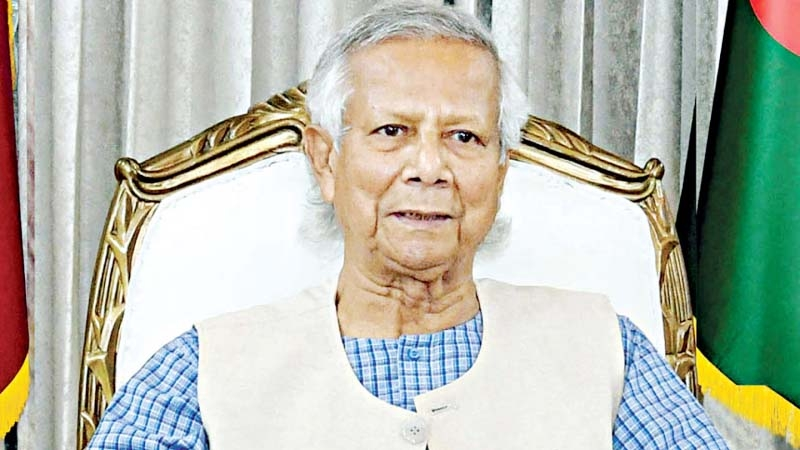- Myanmar: UN chief for urgent access as quake toll mounts |
- AI’s $4.8 tn future: UN warns of widening digital divide |
- Volker Turk warns of increasing risk of atrocity crimes in Gaza |
- Ultimate goal is to join ASEAN as full member, says Dr Yunus |
- South Korea President Yoon Suk Yeol removed from office |
Commissions to reform key institutions announced
Fully reconstituted EC to begin work Oct 1: Prof Yunus

Chief Adviser of Interim Government Prof. Muhammad Yunus.
Dhaka, Sept 11 – Highlighting the importance of improving the electoral system, Chief Adviser Prof Muhammad Yunus on Wednesday announced the formation six commissions with appointment of six eminent citizens as their heads considering their experience in the respective fields.
“After this, we will continue the process of formation of commissions on various other issues,” he said in a televised speech marking the first month of the interim government which was formed on August 8.
The chief adviser said Dr Badiul Alam Majumdar will be the head of Electoral System Reform Commission, Safar Raj Hossain will be the head of Police Administration Reform Commission, Justice Shah Abu Naeem Mominur Rahman will be the head of Judiciary Reform Commission, TIB’s Dr Iftekharuzzaman will be the head of Anti-Corruption Reform Commission, Abdul Mueed Chowdhury will be the head of Public Administration Reform Commission, Dr Shahdeen Malik will head of Constitution Reform Commission.
The names of the other members of these commissions will be decided in consultation with the heads of the respective commissions, Prof Yunus said.
“As we believe in people's right to vote and people's ownership, the improvement of the electoral system has been given importance in our reform ideas,” Prof Yunus said.
He said reforming four institutions - police administration, public administration, judiciary and anti-corruption commission - is essential for free and fair elections as these institutions are related to the electoral system.
“I believe that the reform of these institutions will also contribute to the establishment of a state system with public ownership, accountability and welfare.
In addition, he said, they feel the need for constitutional reforms to ensure the representation and interests of people from all walks of life and to reflect the message of the July mass uprising.
Prof Yunus said the Election Commission, once fully constituted, is expected to formally begin its work on October 1 and they expect it to be completed within the next three months.
“Based on the Commission's report, the government will hold consultations with major political parties at the next stage,” he said adding that at the final stage, the outline of reform ideas will be finalised on the basis of a three-to-seven-day long consultation meeting with students, civil society, representatives of political parties and representatives of the government.
“It will also give an idea of how this outline will be implemented,” Prof Yunus said.
Advisory council members, students, workers, representatives of mass movements, representatives of civil society and political parties will be present in the deliberations and consultation meetings of the commissions.
“We believe that this will make the whole nation strong and optimistic in the implementation of the message of the July mass uprising and uniting all to rebuild the state,” Prof Yunus said.
He said they have a lot of work ahead of them and they all want to move towards the same goal. “We all want to ensure equal rights to every member of our family, be he/she sweeper, student, teacher or from any religion. This is the main goal of our reforms. Let us quickly implement the goal of this revolution of students, workers and people.”
Prof Yunus said in their first month, they may not have been able to move forward with the speed and enthusiasm that they had in view of the actual situation.
“If the law and order situation of the country is kept normal, we hope we can boost our speed a lot. For this reason, I am asking for the cooperation of all the people of the country - teachers, students, farmers, workers, professionals, big businesspeople, small businesspeople, day laborers, housewives,” Prof Yunus said.
He said their work is tough, but as a nation they cannot afford to fail this time. “We must succeed. This success will come because of you and it will come because of your cooperation. Our job will be to make your and my dreams come true.”
Prof Yunus said they are starting the second month. “In our second month, I will try to create strong confidence in your mind.”
“Be patient, I will not tell you this at all. We all get impatient thinking when so much work will be completed. We will be impatient. Why not? But it will work properly. I will show no sign of impatience in work,” he said.
Prof Yunus ended her speech sending his greetings to everyone – people of the country, children, teenagers, young people, students, old people, men and women. - UNB

